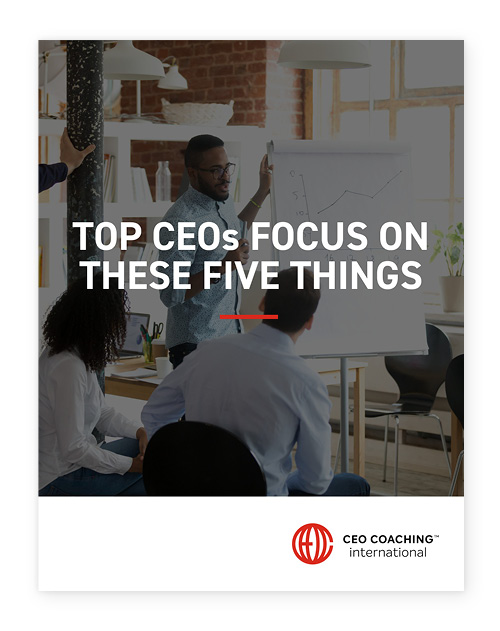
When Franklin D. Roosevelt (FDR) took the oath of office in March of 1933, he hit the ground running.
Within the first 100 days of his presidency, FDR pushed the Emergency Banking Act through Congress to battle the Great Depression, revolutionized how presidents communicate via his fireside chat radio addresses, and unveiled 15 pieces of legislation that would become parts of the New Deal.
Ever since, politicians and CEOs have had to live up to FDR’s example of what “The First 100 Days” should look like.
But is the first 100 days really that critical for new CEOs?
According to McKinsey & Company, both leaders and the public should temper those lofty “first 100 days” expectations.
In today’s business world, 92% of external hires and 72% of internal hires take more than 90 days just to get acclimated to a new job. New CEOs often need around nine months to develop their strategic vision before starting the hard work of building teams and executing key tasks that drive profitability and growth.
The key for a new CEO to succeed in the first 100 days is to determine what needs to get done, then do it with a sense of urgency—but give it the time it needs, not some arbitrary first 100 days.
CEO Roles
So, what needs to get done? Let’s start with something that most new CEOs neglect. You have to decide what kind of CEO do you want to be?
And determining the kind of CEO you want to be requires self-reflection and self-awareness. Define what your philosophy of leadership is. Reflect on what your greatest successes have been and what leadership traits led to that success. Be honest about your shortcomings and hire around you to close those gaps.
Often, this is a great time to hire a CEO coach who has been there and can be your unbiased, outside confidant now that you have the loneliest job in the company.
With greater self-clarity and the help of a coach, you can move into the CEO role brimming with confidence.
As the new CEO, it’s time to assess and move forward on these five key roles of the CEO.
1. Vision
You’re the CEO, you need to drive the vision and set the direction for the company. This requires clarity and frequent and consistent communication of where the firm is heading. Develop a meeting rhythm and accountability system to make sure the vision is on track. Oh, and be BIG in your vision. Incremental thinking will get you incremental results.
Get out and talk to your team members. Get their feedback, digest it, then cast your vision and rally the team.
As the CEO, ask yourself, “Where is this firm going? Where should it go? What adjustments do we need to make to get us moving in the right direction in my first 100 days and beyond?”
2. Cash
You could have a wonderful vision but if you’re bleeding cash, you might run out of time to implement it. Right away talk to your CFO and get a handle on the company’s cash and cash flow situation. Determine what daily, weekly, and monthly financial reports you need and what key financial metrics you need to monitor.
Ask yourself, “Is our cash situation a strength or a problem that we need to shore up? What do I need to better understand about monitoring our financial situation? Do I have the right financial team in place for the future growth I am anticipating?”
3. People
This is a biggie. From day one, assess the team around you. You’ve got to make sure you have the right team in the right roles if you want any hope of driving your vision. As the new CEO, this is a great time to “break” with any holdovers who are not in line with your vision and who aren’t suited for what the company needs for its next stage of growth.
Ask yourself, “What roles do I need to make sure I have A+ performers in? Who on my team should stay where they are, move to a new role, or be respectfully shown the door? What can I do to ensure my C-suite functions as a high-performance team and not just a collection of self-absorbed stars?
4. Key Relationships
As the CEO, you play a big role in nurturing key relationships. These could be people inside the company, top clients, bankers, attorneys, board members, political officials or a multitude of others. A key relationship is someone who could have a big impact on your company, and not just in your first 100 days. For example, if you’re Bob Chapek, the CEO of Disney, you might want to have Florida Governor Ron DeSantis on speed dial.
Ask yourself, “Which relationships could make or break our company? Who in the company do I need to nurture? Who outside the company do I need to nurture. Which clients, and potential clients, should I go deeper with?”
5. Learning
The best CEOs are not know-it-alls. They are learn-it-alls. You have to learn faster than the world is changing or you’ll become a “former CEO” in a flash. Read widely. Listen to podcasts. Network with people inside and outside your industry. Hire a coach. Join an executive association or peer group.
Ask yourself, “What do I need to get up to or stay up to speed on?” What ‘knowledge’ can I outsource versus what do I have to know myself? How can I build learning time into my already busy schedule? Bill Gates was famous for ‘think weeks,’ what’s my version of that?”
Make BIG Happen in First 100 Days
As the new CEO, expectations are high and hope is in the air. You have a tremendous opportunity to shape the direction of the firm and lead it to its next level of BIG growth. And while the first 100 days is important, don’t let that arbitrary round number force you into making suboptimal decisions that you’ll soon regret.
Take the time to get it right, but maintain a sense of urgency. Six to nine months is plenty of time to do your homework and cast a vision that inspires your team and sets a new course for growth.

Focus on these 5 Things as a CEO
If you look at CEOs who have built high-growth companies, it’s clear that they share some of the same characteristics that contribute to effective leadership – across industries, across countries, and across continents. The CEOs who are truly top performers always seem to focus on these five important things.
About CEO Coaching International
CEO Coaching International works with CEOs and their leadership teams to achieve extraordinary results quarter after quarter, year after year. Known globally for its success in coaching growth-focused entrepreneurs to meaningful exits, the firm has coached more than 1,500+ CEOs and entrepreneurs across 100+ industries and 60 countries. Its coaches—former CEOs, presidents, and executives—have led businesses ranging from startups to over $10 billion, driving double-digit sales and profit growth, many culminating in eight, nine, or ten-figure exits.
Companies that have worked with CEO Coaching International for two years or more have achieved an average revenue CAGR of 25.9%, nearly 3X the U.S. average, and an average EBITDA CAGR of 39.2%, more than 4X the national benchmark.
Discover how coaching can transform your leadership journey at ceocoachinginternational.com.
Learn more about executive coaching | Meet our world-class coaches






